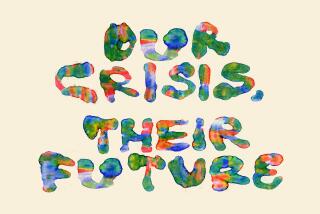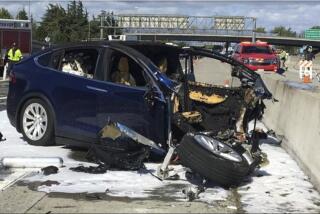Peering Into the Brave New World of the Next Century
- Share via
LONDON — Prince Harry will head into space and humans will land on Mars.
There will be sex purely for love and lust, while fertilization will be achieved through reproduction “banks.”
And the attention span could be in trouble.
They sound like supermarket-tabloid topics but these speculations are among the predictions offered by 30 intellectuals peering into the next century.
The Oxford University Press anthology “Predictions” is a provocative, playful and at times sobering look at the 21st century, as envisioned by scientists, writers and philosophers. It’s a small volume with big ideas, published here and set for release early next year in the United States.
However, Sian Griffiths, the anthology editor, is quick to note: “Nobody is predicting the end of the world.”
Through snappy profile pieces and sharp essays, the intellectuals dive into the next 100 years in what amounts to the ultimate millennium parlor game. Dealing in everything from birth to death, artificial intelligence to robotics and politics to medicine, they foresee a brave new world in the coming century.
Changing decades and centuries provide people with opportunities to make outlandish claims about the future--most of which turn out to be way off the mark.
But some of this book’s material is magical. Take the predictions from science-fiction writer Arthur C. Clarke, author of “2001: A Space Odyssey.”
It’s Clarke who forecasts the travel adventure of Prince Charles’ younger son, Harry, the first space-bound royal who “may even stop off at the Hilton Orbiter hotel.”
By 2021, humans will land on Mars, he adds, and in 2057, the centennial of the Sputnik satellite launch will include celebrations on Earth, the moon, Mars, Jupiter’s moons Europa and Ganymede and Saturn’s largest moon, Titan.
Clarke also predicts that, after 2020, there will be two intelligent species on Earth: humans and one evolving from artificial intelligence.
Clarke’s optimistic embrace of the future is countered by neuroscientist Susan Greenfield’s lament that, despite all the gains, biomedical advances could be misused. She wonders if George Orwell’s world of 1984 might arrive by 2084, with humans monitored “from their genes and molecules through to their mental worlds.”
As the young interact with virtual-reality products, Greenfield says, there is a risk the attention span and imagination needed to read may no longer exist and “we may end up a society of restless, unimaginative individuals.”
According to Carl Djerassi, the chemist who helped bring the birth control pill to the world, human fertility is due for a change. In the next 30 years, perhaps, “sex and fertilization will be separate” and the 21st century could be known the century of “A.R.T.--assisted reproductive technologies.”
Djerassi pictures young men and women opening “reproductive bank accounts full of frozen sperm and eggs. And when they want a baby, they’ll go to the bank to check out what they need.”
Telephones and faxes could be headed for the junk heap if Kevin Warwick is proved right. The British cybernetics professor sees humans using implant technology to link with computers, allowing our minds to open doors, turn on lights.
Linguist and author Noam Chomsky is perhaps the most downbeat, wondering “whether humans are a kind of lethal mutation.”
However, he does offer what is likely the safest forecast, writing that “perhaps the most plausible prediction is that any prediction about serious matters is likely to be off the mark, except by accident.”
More to Read
Sign up for our Book Club newsletter
Get the latest news, events and more from the Los Angeles Times Book Club, and help us get L.A. reading and talking.
You may occasionally receive promotional content from the Los Angeles Times.







